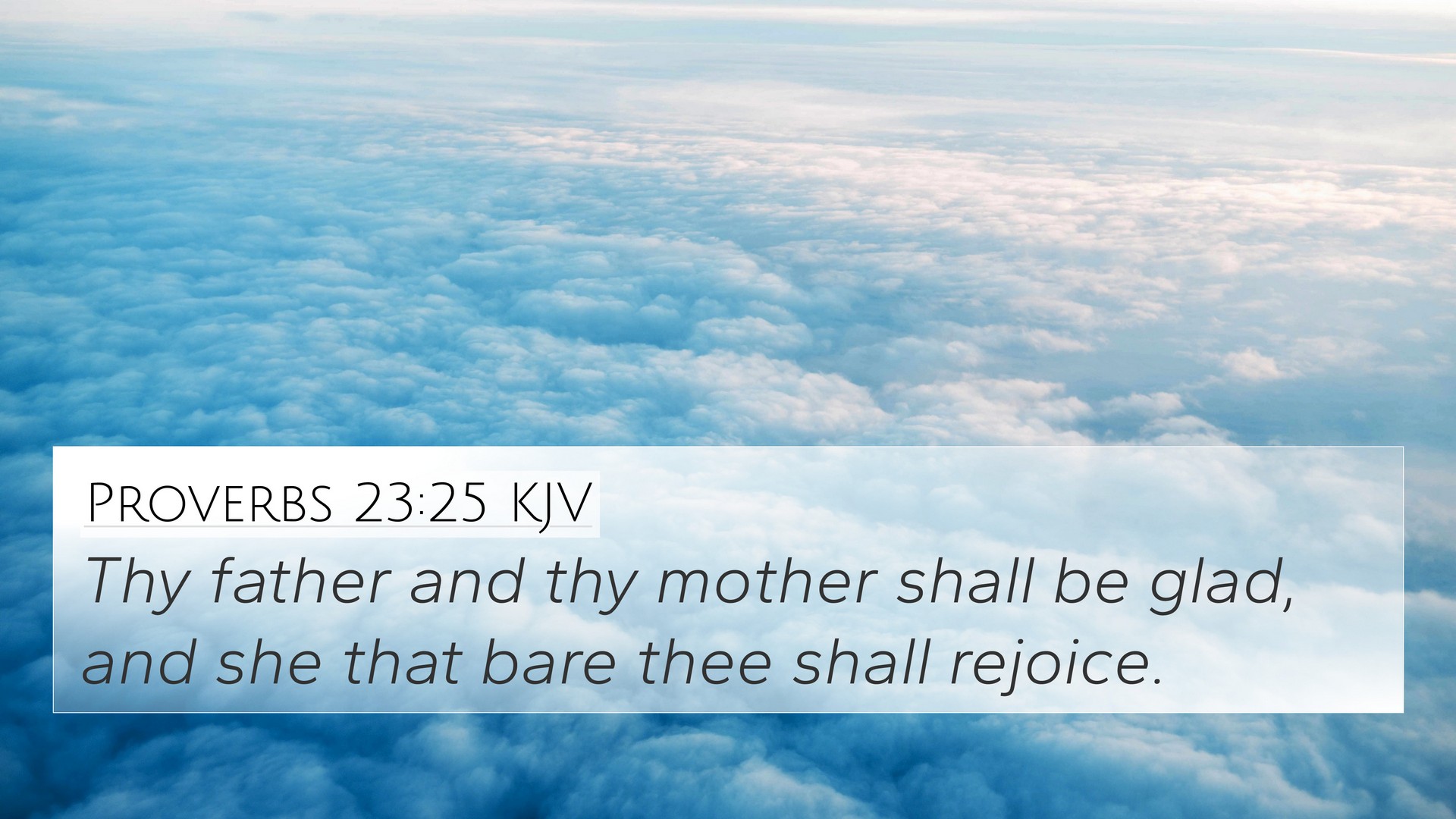Understanding Proverbs 23:25
Proverbs 23:25 states, "Let your father and mother be glad; let her who bore you rejoice." This verse emphasizes the significance of familial relationships, particularly the joy that comes from honoring and maintaining a good relationship with one's parents.
Overview of the Meaning
This verse highlights the importance of parental joy as a direct result of the child’s good conduct and respect. The message serves as a reminder of the responsibility children have toward their parents and the impact of their actions on their family's happiness.
- Proverbs 10:1: "A wise son brings joy to his father, but a foolish son brings grief to his mother." This cross-reference underlines the idea that children’s behavior directly affects their parents’ emotions.
- Exodus 20:12: "Honor your father and your mother, that your days may be long upon the land which the Lord your God is giving you." This commandment connects respect for parents with longevity and blessings from God.
- Colossians 3:20: "Children, obey your parents in everything, for this pleases the Lord." Here, the New Testament echoes the Old Testament covenant of honoring parents, aligning with the principle of familial respect.
- Proverbs 1:8: "Hear, my son, your father's instruction, and forsake not your mother's teaching." This verse parallels with the same theme of valuing parental guidance and wisdom.
- Psalm 127:3: "Behold, children are a heritage from the Lord, the fruit of the womb a reward." This indicates the value of children as blessings, reflecting the idea that children can bring joy to parents.
- Malachi 4:6: "And he will turn the hearts of fathers to their children and the hearts of children to their fathers." This emphasizes restoration and the joy that comes from reconciled family relationships.
- Ephesians 6:1: "Children, obey your parents in the Lord, for this is right." This reinforces the biblical principle of obedience and the joy it brings families.
Integration of Commentary Insights
According to Matthew Henry, this verse serves as both an exhortation and a promise. If children act wisely and righteously, it will inevitably result in their parents’ happiness. This aligns with a broader theme in Proverbs, where wise living leads not only to personal blessings but also to familial joy.
Albert Barnes elaborates on the fulfillment derived from familial harmony and joy arising from a child’s good character. He emphasizes the societal benefits of maintaining affectionate family ties, illustrating how such joy may transcend individual families and contribute to communal well-being.
Adam Clarke highlights the moral obligation children have to contribute to their parents' happiness. The notion of filial responsibility is at the forefront, inviting children to consider the impact of their behavior on parental joy. Clarke suggests that such joy brings about a ripple effect of blessings within the family unit.
Importance of Contextual Understanding
In reading Proverbs 23:25, it is crucial to understand its context within the broader chapters of Proverbs that emphasize wisdom, instruction, and relationships. This verse operates within a rich tapestry of biblical themes centering on respect, honor, and familial bonds.
Practical Application
To embody this verse today, individuals can seek to strengthen their relationships with their parents through:
- Open Communication: Engage in honest conversations to understand and appreciate your parents' perspectives.
- Acts of Kindness: Show your love through small gestures that bring joy to your parents.
- Seeking Wisdom: Value your parents’ advice and experiences as vital components of your growth.
Conclusion
In conclusion, Proverbs 23:25 encapsulates a message of love, respect, and the shared joy of familial relationships. By understanding and implementing this verse and its connections to other scriptures, individuals can uphold the value of honoring their parents, fostering a loving and respected family environment.
Further Study
For those interested in exploring the connections between Bible verses further, tools for Bible cross-referencing such as a Bible concordance or a Bible cross-reference guide can provide insights into themes and teachings. Such resources are invaluable for anyone looking to deepen their understanding of scriptural ties and the messages intertwined throughout the Bible.
Additional Cross-References
Here are some additional references that elaborate on the themes found in Proverbs 23:25:
- Proverbs 29:17: "Discipline your son, and he will give you rest; he will give delight to your heart."
- 1 Timothy 5:4: "But if a widow has children or grandchildren, let them first learn to show piety at home and to repay their parents; for this is good and acceptable before God."
- Proverbs 15:20: "A wise son makes a glad father, but a foolish man despises his mother."
- Deuteronomy 6:7: "You shall teach them diligently to your children, and shall talk of them when you sit in your house, and when you walk by the way, and when you lie down, and when you rise."
- Matthew 15:4: "For God commanded, saying, ‘Honor your father and mother,’ and, ‘He who curses father or mother, let him be put to death.’"








